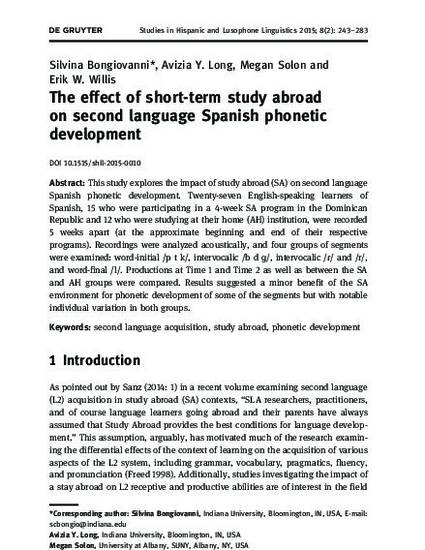
Article
The effect of short-term study abroad on second language Spanish phonetic development
Studies in Hispanic and Lusophone Linguistics
(2015)
Abstract
This study explores the impact of study abroad (SA) on second language Spanish phonetic development. Twenty-seven English-speaking learners of Spanish, 15 who were participating in a 4-week SA program in the Dominican Republic and 12 who were studying at their home (AH) institution, were recorded 5 weeks apart (at the approximate beginning and end of their respective programs). Recordings were analyzed acoustically, and four groups of segments were examined: word-initial /p t k/, intervocalic /b d ɡ/, intervocalic /ɾ/ and /r/, and word-final /l/. Productions at Time 1 and Time 2 as well as between the SA and AH groups were compared. Results suggested a minor benefit of the SA environment for phonetic development of some of the segments but with notable individual variation in both groups.
Keywords
- second language acquisition,
- study abroad,
- phonetic development
Publication Date
January 1, 2015
DOI
10.1515/shll-2015-0010
Publisher Statement
This article was published in Studies in Hispanic and Lusophone Linguistics, volume 8, issue 2, 2015 by De Gruyter. The article can also be found online at this link: https://doi.org/10.1515/shll-2015-0010.
Citation Information
Silvina Bongiovanni, Avizia Y. Long, Megan E Solon and Erik W. Willis. "The effect of short-term study abroad on second language Spanish phonetic development" Studies in Hispanic and Lusophone Linguistics Vol. 8 Iss. 2 (2015) p. 243 - 283 ISSN: 2199-3386 Available at: http://works.bepress.com/avizia-long/13/
